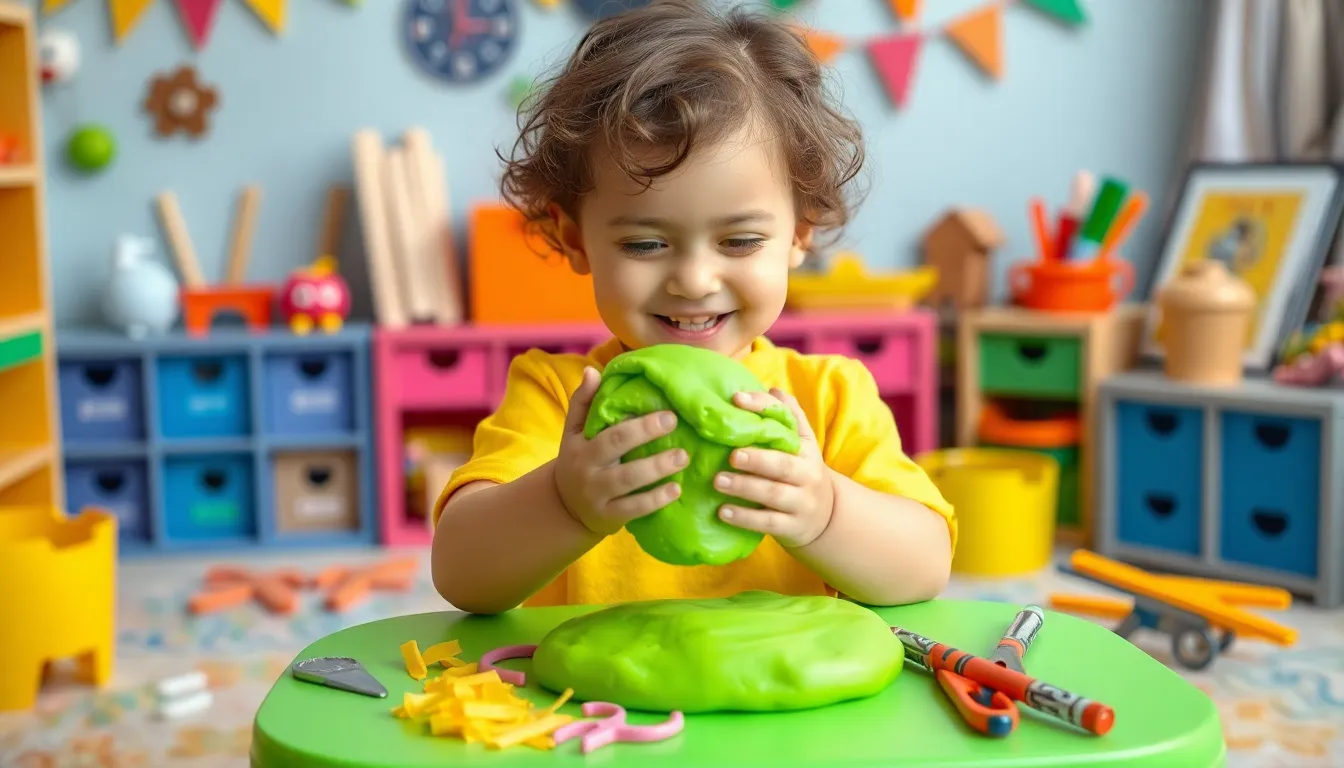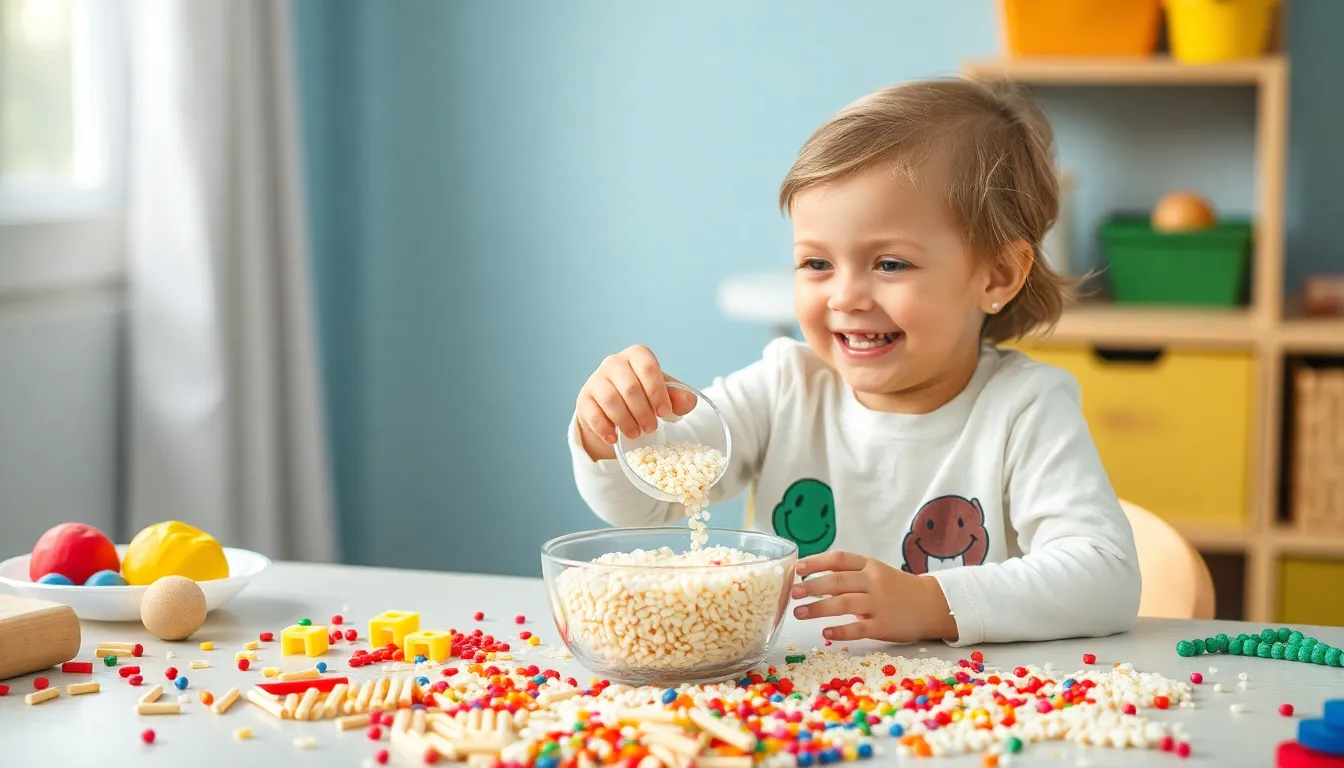Physical Address
304 North Cardinal St.
Dorchester Center, MA 02124
Physical Address
304 North Cardinal St.
Dorchester Center, MA 02124

Every parent knows that toddlers have an uncanny ability to turn any room into a disaster zone, but what if that chaos could be harnessed for good? Enter fine motor activities! These delightful little tasks not only keep tiny hands busy but also help develop essential skills like coordination and dexterity. Who knew that those little fingers could be so powerful?
From squishing playdough to threading pasta, toddler fine motor activities are the secret sauce to transforming your living room into a mini workshop. Not only do these activities boost creativity, but they also pave the way for future skills like writing and self-feeding. So grab those tiny hands and let the fun begin—because who wouldn’t want to turn a mess into a masterpiece?
Engaging in fine motor activities provides toddlers with essential developmental advantages. These benefits extend across various skill areas, enhancing their overall growth.
Fine motor activities significantly improve hand-eye coordination. Tasks like threading pasta require toddlers to focus on precise movements. Activities that involve pinching or grasping help refine their dexterity. Using tools such as scissors promotes control over fine motor skills. Mastering these movements paves the way for tasks like writing and self-feeding. Improved coordination also boosts confidence, encouraging toddlers to explore their abilities further.
Cognitive skills receive a vital boost from engaging in fine motor activities. Manipulating objects helps strengthen problem-solving abilities. When toddlers create structures with blocks or engage in puzzles, they enhance critical thinking. These activities promote spatial awareness, as they learn how objects interact in their environment. Furthermore, fine motor tasks stimulate creativity, allowing toddlers to express themselves. Overall, these experiences foster cognitive connections, laying the foundation for lifelong learning.

Engaging toddlers in fine motor activities incorporates play with skill development. Two effective categories include arts and crafts and sensory play.
Arts and crafts foster creativity and enhance fine motor skills. Toddlers create with materials such as crayons, markers, and paper. They learn to hold tools correctly while drawing or coloring. Simple tasks like tearing paper or gluing shapes develop hand strength. Exploring various textures and colors keeps children motivated. Activities like finger painting or making collages offer endless opportunities for self-expression. Through these experiences, toddlers improve their grasp and control, essential for later tasks like writing.
Sensory play stimulates imagination while sharpening fine motor skills. Activities include manipulating materials like sand, rice, or water. Pouring, scooping, and using tools like spoons provide tactile experiences that enhance dexterity. Engaging in playdough activities allows for squishing and rolling, directly benefiting hand strength. Additionally, incorporating items like beads or buttons encourages toddlers to practice threading and sorting. Sensory bins filled with various items spark curiosity and promote exploration of textures, shapes, and weights. Through this hands-on learning, toddlers gain valuable skills in a fun environment.
Creating a supportive environment can significantly enhance fine motor development. Toddlers thrive in spaces that are safe and structured. Safety measures should include removing sharp objects and clutter to provide clear pathways for movement. Non-toxic materials like playdough reinforce safety while offering the chance to explore textures and shapes.
Providing the right tools is essential for fine motor skill development. Selecting age-appropriate items like large crayons, safety scissors, and easy-to-grasp toys can make a notable difference. Tools designed for small hands should encourage comfortable manipulation. Frequent interaction with a variety of textures and materials fosters creativity and dexterity. Engaging toddlers with these tools lays the groundwork for more complex skills as they grow and explore their abilities.
Integrating fine motor activities into daily routines enhances toddlers’ skills while keeping them engaged. Simple moments, like snack time, become opportunities for development.
Offering finger foods encourages toddlers to practice grasping and pinching. Small pieces of fruit, such as blueberries or grapes, foster fine motor skills as they learn to pick up and manipulate different textures. Parents can create fun tasks by arranging food items for sorting or building towers with blocks of cheese. Involving toddlers in pouring juice or water into cups aids hand-eye coordination. Making these moments interactive keeps toddlers focused and promotes self-feeding.
Playtime serves as an ideal setting for fine motor skill enhancement. Activities like playdough manipulation provide a tactile experience while strengthening hands through squishing and rolling. Setting up a crafting station with materials like paper and scissors encourages toddlers to explore cutting. Engaging in games like threading pasta or beads develops dexterity while improving concentration. Each playtime session can introduce new challenges to stimulate creativity and motor control, ensuring a well-rounded approach to skill development.
Embracing fine motor activities for toddlers is a powerful way to support their development. These engaging tasks not only foster essential skills but also encourage creativity and exploration. Parents can transform everyday moments into learning opportunities by incorporating activities into routines.
Creating a safe and stimulating environment allows toddlers to thrive as they manipulate various materials. As they practice grasping and using tools, they build confidence and enhance their abilities. The messiness of play is a small price to pay for the invaluable skills gained. By prioritizing fine motor development, parents set their toddlers on a path toward lifelong learning and success.